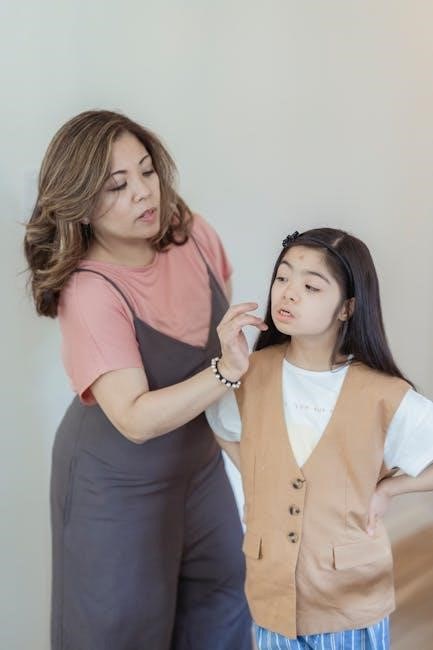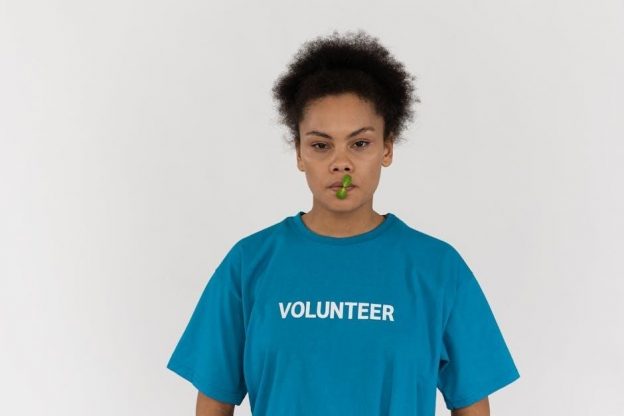A friendly and reassuring guide for girls as they approach puberty, explaining the changes that will happen to their bodies as they grow up. This period marks a natural transition to womanhood, bringing physical and emotional changes that can be both exciting and challenging. Understanding these changes helps girls feel confident and prepared for the journey ahead, fostering a positive mindset toward health and well-being.
1.1 Understanding the Onset of Puberty
Puberty typically begins between ages 8 and 13, triggered by hormonal changes. Early signs include breast budding and hair growth underarms/puberty. Emotional shifts may emerge as the body matures. Each girl’s timeline varies, influenced by genetics and health. Open dialogue with trusted adults helps ease concerns, fostering confidence during this transition. Understanding the onset ensures girls are prepared mentally and physically, embracing changes as natural steps toward adulthood.
1.2 Physical and Emotional Changes to Expect
During puberty, girls experience noticeable physical changes, such as breast development, growth spurts, and the onset of menstruation. Emotional shifts, including mood swings and self-esteem challenges, are common due to hormonal fluctuations. It’s important to acknowledge these changes and provide reassurance. Open communication and support help girls navigate this transformative phase, fostering resilience and confidence. Understanding these changes equips them to manage both physical and emotional aspects effectively, ensuring a smoother transition into adolescence.
1.3 Importance of Open Communication
Open communication is key to helping girls navigate puberty with confidence. Encouraging honest conversations about changes, feelings, and concerns fosters trust and understanding. Parents and guardians should create a safe, non-judgmental space for questions and discussions. Active listening and providing accurate, age-appropriate information can ease anxiety and confusion. By promoting open dialogue, girls feel supported and empowered to handle the challenges of growing up. This communication lays the foundation for healthy relationships and lifelong well-being, ensuring they feel heard and guided throughout their journey.

Physical Development
Physical development during puberty includes breast growth, height increases, and body shape changes. Hormonal shifts cause these transformations, preparing the body for womanhood while promoting overall health.
2.1 Breast Development and Body Shape Changes
Breast development is one of the first noticeable signs of puberty, typically starting around age 10-11. Hormonal changes trigger the growth of breast buds, which gradually develop into fuller breasts. Body shape changes include wider hips, a narrower waist, and increased fat distribution in the thighs and buttocks. These transformations vary in timing and pace for each girl, making it important to embrace individual differences. Understanding these changes helps girls feel more comfortable with their evolving bodies, fostering confidence and self-acceptance during this natural process of growth and development into womanhood.
2.2 Menstruation and Hygiene Tips
Menstruation is a natural part of life, marking the start of a girl’s reproductive cycle. It’s important to understand that it’s a normal process and not something to be embarrassed about. Proper hygiene is crucial during this time. Use sanitary pads, tampons, or menstrual cups to manage flow, and change them regularly to prevent odor and infection. Always wash hands before and after handling hygiene products. Showering daily and wearing clean clothes helps maintain freshness. Tracking periods can help prepare for monthly cycles. If experiencing heavy bleeding, pain, or irregular cycles, consult a trusted adult or healthcare professional for guidance and support.
2.3 Skin Care and Acne Management
During puberty, hormonal changes can lead to acne and oily skin. A consistent skincare routine is essential to maintain healthy skin. Wash your face twice daily with a gentle cleanser to remove dirt and oil. Moisturize to keep skin hydrated, even if it’s oily. Avoid heavy makeup and always remove it before bed. Resist the urge to pop pimples, as this can cause scarring. Eating a balanced diet rich in fruits, vegetables, and whole grains, along with staying hydrated, can help improve skin health. If acne persists, consider consulting a dermatologist for personalized advice.

Emotional and Mental Health
Puberty brings emotional ups and downs, with mood swings and self-esteem challenges. Open communication with trusted adults and friends helps navigate these feelings. Encourage self-care practices like journaling or talking about emotions to maintain mental well-being and build resilience during this transitional phase.
3.1 Managing Mood Swings and Emotional Ups and Downs
Managing mood swings during puberty requires understanding and patience. Girls may experience sudden emotional shifts due to hormonal changes. Encourage open conversations about feelings, teaching healthy ways to express emotions. Techniques like journaling, mindfulness, or physical activity can help regulate mood. Creating a supportive environment where girls feel safe to discuss their emotions fosters resilience. Remind them it’s okay to seek help and that these feelings are temporary. With time and support, they can learn to navigate these changes confidently and maintain emotional balance.
3.2 Building Self-Esteem and Confidence
Building self-esteem and confidence is crucial during puberty. Encourage girls to embrace their unique qualities and strengths. Positive affirmations and recognizing achievements can foster a positive self-image. Teach them to view criticism as an opportunity for growth rather than failure. Support their interests and hobbies, allowing them to develop skills and confidence. Surrounding themselves with positive influences and role models can also enhance their self-esteem. Remind them that everyone has strengths and weaknesses, and it’s okay to ask for help. Cultivating self-belief helps them navigate challenges with resilience and confidence.
3.3 Coping with Anxiety and Stress
Coping with anxiety and stress during puberty is essential for emotional well-being. Encourage girls to identify triggers and practice relaxation techniques like deep breathing or meditation. Positive communication with trusted adults or friends can help alleviate worries. Engaging in physical activities or hobbies can reduce stress and improve mood. Teach problem-solving skills to address challenges effectively. Remind them that seeking help is a sign of strength. Building resilience through positive thinking and self-care routines can empower them to manage stress confidently and maintain emotional balance during this transitional phase of life.

Social Changes and Relationships
As girls grow, social dynamics evolve, bringing new friendships, peer influences, and romantic feelings. Navigating these changes requires open communication, empathy, and understanding boundaries, fostering healthy connections and self-assurance.
4.1 Navigating Friendships and Peer Pressure
As girls enter puberty, friendships often evolve, and peer pressure becomes more common. It’s important to surround yourself with supportive friends who respect your values. Open communication and empathy can strengthen relationships, while setting boundaries helps maintain individuality. Peer pressure may lead to challenging situations, but staying true to yourself and making informed decisions fosters confidence. Encouraging positive interactions and seeking guidance from trusted adults when needed can help navigate these social changes smoothly, building a strong foundation for healthy relationships.
4.2 Understanding Crushes and Romantic Feelings
Crushes and romantic feelings are a natural part of growing up, often bringing excitement and curiosity. It’s important to recognize these emotions and handle them with maturity. Open communication with trusted friends or family can provide guidance and reassurance. Respecting personal boundaries and understanding the other person’s feelings fosters healthy relationships. Remember, it’s okay to take time to process emotions and make decisions that align with your values. These experiences help build self-awareness and prepare you for meaningful connections in the future, teaching valuable lessons about love and respect.
4.3 Building Healthy Boundaries
Establishing healthy boundaries is crucial for maintaining respect and balance in relationships. Learning to say “no” and communicating your needs clearly helps protect your emotional and personal space. It’s important to respect others’ boundaries while expecting the same in return. Setting limits fosters trust and understanding, allowing relationships to grow in a positive way. Prioritizing your own comfort and well-being ensures that you feel safe and valued. Healthy boundaries empower you to navigate relationships confidently, whether with friends, family, or romantic partners, promoting mutual respect and emotional resilience.

Hygiene and Self-Care
Good hygiene and self-care are essential for confidence and overall well-being. Regular routines, skincare, and healthy habits help maintain a fresh, positive appearance and mindset daily.
5.1 Daily Skincare Routine
A consistent skincare routine helps maintain healthy, glowing skin. Start with cleansing twice daily to remove dirt and impurities. Use a gentle cleanser suitable for your skin type. Moisturize afterward to hydrate and protect the skin. Apply sunscreen with SPF 30 or higher during the day for UV protection. Exfoliate once or twice a week to remove dead skin cells. Keep your hands clean before touching your face to prevent breakouts. Remove makeup thoroughly at night to allow your skin to breathe; Consistency is key to achieving a clear, radiant complexion.
- Cleanse twice daily with a gentle cleanser.
- Moisturize to hydrate and protect the skin.
- Apply sunscreen with SPF 30+ during the day.
- Exfoliate once or twice weekly for glowing skin.
- Keep hands clean before touching your face.
- Remove makeup thoroughly at night.
5.2 Hair Care Tips for Different Hair Types
Understanding your hair type is key to effective care. For straight hair, use lightweight products and avoid heavy styling. Curly hair thrives with moisturizing products and a diffuser to enhance natural texture. Wavy hair benefits from texturizing sprays and air-drying. Oily hair requires gentle, frequent washing and a dry shampoo for touch-ups. Always use a wide-tooth comb to minimize breakage. Protective styles like braids or buns can help maintain healthy hair. Regular trims prevent split ends, keeping your hair strong and vibrant. Tailor your routine to your hair type for the best results.
- Moisturize curly hair with sulfate-free products.
- Enhance waves with sea salt sprays.
- Use dry shampoo for oily hair.
- Protect hair with braids or buns.
- Trim regularly to avoid split ends.
5.3 Importance of Oral Hygiene
Maintaining good oral hygiene is crucial for overall health and confidence. Brush your teeth twice daily with fluoride toothpaste, paying attention to all surfaces, and floss once a day to remove plaque between teeth. Regular dental check-ups help prevent cavities and gum disease. Limit sugary and acidic foods to protect enamel. A healthy smile boosts self-esteem and prevents bad breath. Practicing consistent oral care habits early on sets the foundation for a lifetime of dental well-being and confidence in social interactions.
- Brush teeth twice daily with fluoride toothpaste.
- Floss once a day to remove plaque.
- Limit sugary and acidic foods.
- Visit the dentist regularly for check-ups.

Nutrition and Exercise
A balanced diet rich in nutrients supports growth and energy levels, while regular physical activity promotes strength and overall health during puberty.
6.1 Balanced Diet for Optimal Growth
A balanced diet is crucial during puberty to support rapid growth and development. Include a variety of nutrient-rich foods like lean proteins, whole grains, fruits, and vegetables. These provide essential vitamins, minerals, and energy for bodily changes. Calcium and vitamin D are vital for bone health, while iron supports blood cell production. Healthy fats, such as those in nuts and avocados, aid brain development. Limit sugary and processed foods to maintain a healthy weight and energy levels. Staying hydrated with water is also key for overall well-being.
6.2 Exercise Routines for Teen Girls
Regular exercise is essential for teen girls to maintain physical and mental well-being during puberty. Incorporate a mix of cardio, strength training, and flexibility exercises, such as jogging, cycling, yoga, or Pilates, for at least 60 minutes daily. Physical activity boosts mood, energy levels, and sleep quality while supporting bone and muscle development. Consistency is key to building healthy habits and confidence. Encourage fun workouts with friends or family to make exercise enjoyable and sustainable for a lifelong commitment to health.
6.3 Maintaining a Healthy Weight
Maintaining a healthy weight during puberty is crucial for overall well-being. Focus on balanced nutrition with portion control, avoiding extreme diets. Encourage mindful eating and regular physical activity to support natural growth. A positive body image and self-esteem are key to a healthy relationship with food and exercise. Avoid comparisons and celebrate individuality, ensuring a supportive environment for teens to thrive physically and emotionally during this transformative phase.

Education and Learning
Education is key to personal growth and empowerment. Stay organized, develop effective study habits, and manage time wisely to excel academically. Engage in extracurricular activities to broaden skills and interests, fostering a well-rounded development during adolescence.
7.1 Importance of School and Academic Performance
School plays a vital role in shaping a girl’s future, providing essential knowledge and life skills. Academic performance boosts confidence, critical thinking, and problem-solving abilities, preparing her for future challenges. Consistent effort in studies fosters discipline and responsibility, key traits for long-term success. Girls who excel academically often develop a stronger sense of self-worth and are better equipped to pursue their goals. Encouraging a love for learning and supporting academic achievements helps build a solid foundation for personal and professional growth throughout her life.
7.2 Tips for Effective Studying and Time Management
To excel academically, girls should create a structured study plan, setting clear goals and priorities. Breaking tasks into smaller, manageable steps helps reduce overwhelm and improves focus. Using tools like calendars or to-do lists can enhance organization and ensure deadlines are met. Minimizing distractions, such as turning off electronic devices, allows for more efficient learning. Regular breaks and a balanced schedule promote mental refreshment. Encouraging active participation in class and seeking help when needed fosters a deeper understanding of subjects. Developing these habits early builds a strong foundation for lifelong learning and success.
7.3 Encouraging Extracurricular Activities
Engaging in extracurricular activities is essential for teen girls, fostering personal growth, teamwork, and skill development. Whether it’s sports, clubs, or volunteering, these activities help explore interests and build confidence. They provide opportunities to meet like-minded peers, enhancing social skills and emotional well-being. Encouraging participation in activities outside academics promotes a balanced lifestyle and helps develop hobbies that can become lifelong passions. Supporting girls in these pursuits empowers them to discover their strengths and contribute positively to their communities, creating a foundation for future success and fulfillment.

Safety and Awareness
Understanding personal safety, online etiquette, and self-defense empowers teen girls to navigate their world confidently. Staying informed and vigilant is crucial for their well-being and protection.
8.1 Understanding Personal Safety and Boundaries
Understanding personal safety and boundaries is essential for teen girls to protect themselves and feel secure. It involves setting clear limits with others, trusting your instincts, and being aware of your surroundings. Learning to say “no” confidently and recognizing when a situation feels unsafe are vital skills. Teaching self-respect and the importance of consent helps girls maintain healthy relationships and avoid potential risks. Open conversations about personal safety empower them to make informed decisions and seek help when needed, fostering a sense of control and confidence in their daily lives.
- Trust your instincts and speak up if uncomfortable.
- Know your rights and assert boundaries clearly.
- Stay informed about personal safety strategies.
Personal safety is a cornerstone of self-respect and empowerment.
8;2 Online Safety and Digital Etiquette
Online safety and digital etiquette are crucial for teen girls in today’s digital world. Understanding how to protect personal information, avoid online predators, and navigate social media responsibly is key. Girls should be mindful of their digital footprint, as online actions can have long-lasting consequences. Teaching them to be kind, respectful, and cautious online fosters healthy digital habits and positive interactions. Encouraging open conversations about online experiences helps them feel supported and informed, ensuring they can safely enjoy the benefits of technology while avoiding potential risks.
- Always prioritize privacy settings on social media;
- Never share personal details with strangers online.
- Be mindful of the content you post or share.
- Report inappropriate or harmful content immediately.
Practicing digital etiquette promotes respect and safety in online spaces.
8.3 Self-Defense Tips for Teen Girls
Self-defense is an essential skill for teen girls to ensure personal safety and confidence. Learning basic techniques can empower them to protect themselves in unexpected situations. Trusting instincts is key—encourage girls to listen to their gut feelings and avoid potentially dangerous scenarios. Teaching them to stay aware of their surroundings, maintain eye contact, and stand confidently can deter potential threats. Verbal assertiveness and knowing when to seek help are equally important. Physical self-defense moves, such as blocking or escaping grabs, can be lifesaving. Encourage participation in self-defense classes for practical training and boosted confidence.
- Stay alert and aware of surroundings.
- Trust your instincts and act decisively.
- Learn basic defensive moves and escape techniques.
- Seek help immediately if feeling unsafe.
Practicing self-defense fosters confidence and preparedness for teen girls.

Family and Support Systems
Families play a crucial role in supporting teen girls through puberty. Open communication with parents or guardians fosters trust and understanding. Building a network of loved ones provides emotional backing, helping girls navigate challenges confidently.
9.1 Communicating with Parents or Guardians
Open and honest communication with parents or guardians is essential during puberty. Girls should feel comfortable discussing changes, concerns, or feelings with their caregivers. Encourage scheduling private conversations to ensure both parties feel heard. Using “I” statements can help express emotions without blame. Parents or guardians should listen actively, offering reassurance and guidance. Building trust through regular, respectful dialogue fosters a supportive environment. Remember, parents have experienced similar transitions and can provide valuable insights. Seeking advice from trusted adults helps girls navigate challenges confidently and responsibly.
9.2 Building a Supportive Network of Friends and Family
Surrounding yourself with a supportive network of friends and family is crucial during puberty. Friends can offer emotional support, share experiences, and provide a sense of belonging. Family members, especially parents or guardians, provide stability and guidance; Building trust and open communication within these relationships fosters a safe environment for discussing concerns or feelings. Encouraging positive and respectful interactions helps create strong bonds. A supportive network not only eases the challenges of growing up but also boosts confidence and self-esteem, helping girls navigate this transition with resilience and grace.
9.3 Seeking Help When Needed
Seeking help when needed is a sign of strength, not weakness. Girls should feel comfortable reaching out to trusted individuals, such as parents, teachers, or counselors, for guidance. Whether it’s navigating emotional challenges or addressing concerns about physical changes, asking for help provides valuable support and reassurance. Remember, it’s okay to not have all the answers, and seeking assistance is a brave step toward understanding and growth. Building the confidence to ask for help fosters resilience and empowers girls to handle life’s challenges with greater ease and confidence.

Financial Literacy
Understanding money management is key for independence. Learning to budget, save, and spend wisely empowers girls to make smart financial decisions and build a secure future.
10.1 Understanding Money and Budgeting
Understanding money and budgeting is a crucial life skill. It involves tracking income and expenses to manage finances effectively. A budget helps prioritize needs over wants, ensuring savings and responsible spending. The 50/30/20 rule is a popular guideline: 50% for necessities, 30% for discretionary spending, and 20% for saving and debt repayment. Teaching girls to budget early fosters financial independence and helps them make informed decisions about earning, saving, and spending. This foundation is essential for long-term financial stability and achieving personal goals.
10.2 Saving and Spending Wisely
Saving and spending wisely are essential skills for financial independence. Start by setting clear goals, such as saving for emergencies or long-term desires. Prioritize needs over wants to avoid unnecessary expenses. Use the 50/30/20 rule: 50% for necessities, 30% for discretionary spending, and 20% for saving. Encourage regular savings habits, even in small amounts, to build a safety net. Teach smart spending by comparing prices, avoiding impulse buys, and delaying purchases to ensure they align with personal values. This approach fosters financial discipline and empowers girls to make confident money decisions.
Understanding how to earn and manage allowances is a crucial life skill. Girls can start by setting clear expectations with parents about chores or tasks tied to their allowance. Encourage them to budget by dividing their money into categories like saving, spending, and giving. Teach the importance of prioritizing needs over wants and avoiding impulse purchases. Introduce the concept of saving a portion of their allowance for long-term goals, such as college or personal interests. This helps build financial responsibility and independence from an early age.
Personal Growth and Goals
Personal growth involves self-reflection, self-improvement, and setting meaningful goals. Girls can develop hobbies, build confidence, and cultivate resilience, fostering a mindset that embraces challenges as opportunities for growth.
11.1 Setting Short-Term and Long-Term Goals
Setting goals helps girls establish direction and focus. Short-term goals, like improving grades or learning a new skill, build confidence and create a sense of accomplishment. Long-term goals, such as career aspirations or personal development, guide bigger life decisions. Writing down goals makes them tangible and trackable. Breaking them into smaller steps fosters accountability and progress. Celebrating achievements, no matter how small, reinforces a growth mindset and motivates continuous effort. This process helps girls develop resilience, self-discipline, and clarity, empowering them to shape their future with purpose and confidence.
11.2 Developing Hobbies and Interests
Developing hobbies and interests is a great way for girls to explore their passions and talents. Whether it’s painting, playing an instrument, or joining a sports team, these activities foster creativity, confidence, and self-expression. Hobbies provide opportunities to meet like-minded friends and build social connections. They also serve as a healthy outlet for stress and emotions. Encouraging girls to try new things helps them discover what truly excites them. By nurturing these interests, they can develop skills and interests that will enrich their lives and empower them to embrace their unique qualities and talents, leading to a fulfilling and purposeful life.
11.3 Cultivating a Growth Mindset
Cultivating a growth mindset empowers girls to embrace challenges, view failures as learning opportunities, and believe in their ability to grow and improve. This mindset fosters resilience, confidence, and a love for learning. By encouraging effort and persistence, girls can overcome obstacles and achieve their goals. A growth mindset also helps them understand that success is not just about talent but about dedication and hard work. Nurturing this perspective allows girls to approach life with curiosity and optimism, unlocking their full potential and preparing them for lifelong success and personal growth.
Preparing for Adulthood
Preparing for adulthood involves understanding responsibilities, embracing independence, and developing life skills to navigate the world confidently. It’s about setting goals, making informed decisions, and being self-sufficient.
12.1 Understanding Responsibilities and Independence
Understanding responsibilities and independence is crucial as girls transition into adulthood. It involves taking ownership of actions, managing time effectively, and making informed decisions. Independence fosters self-reliance, while responsibilities teach accountability. Developing these skills helps build confidence and prepares young women to handle life’s challenges. Practicing accountability, setting personal goals, and learning to manage finances are key steps in embracing independence. This foundation is vital for creating a balanced and fulfilling adult life, where decision-making and problem-solving become second nature.
12.2 Planning for College or Career Paths
Planning for college or career paths is an exciting yet important step in a girl’s transition to adulthood. It involves exploring interests, researching options, and setting clear goals. Encourage seeking guidance from mentors, counselors, or professionals to make informed decisions. Creating a roadmap, whether for higher education or entering the workforce, helps build focus and direction. Aligning choices with strengths and passions ensures a fulfilling future. Staying open-minded and adaptable allows for growth and changes in plans. Regularly assessing and adjusting goals helps maintain a clear vision and purpose.
12.3 Building Life Skills for the Future
Building life skills is essential for a smooth transition into adulthood. Girls should focus on developing problem-solving, decision-making, and critical thinking abilities. Practical skills like cooking, budgeting, and time management are also vital. Emotional resilience, adaptability, and effective communication are key for navigating real-world challenges. Encouraging independence and self-reliance helps girls feel confident in handling responsibilities. Mentorship and hands-on experiences can further enhance these skills. By mastering these abilities, girls will be well-prepared to embrace opportunities and overcome obstacles, ensuring a strong foundation for their future success and independence.
